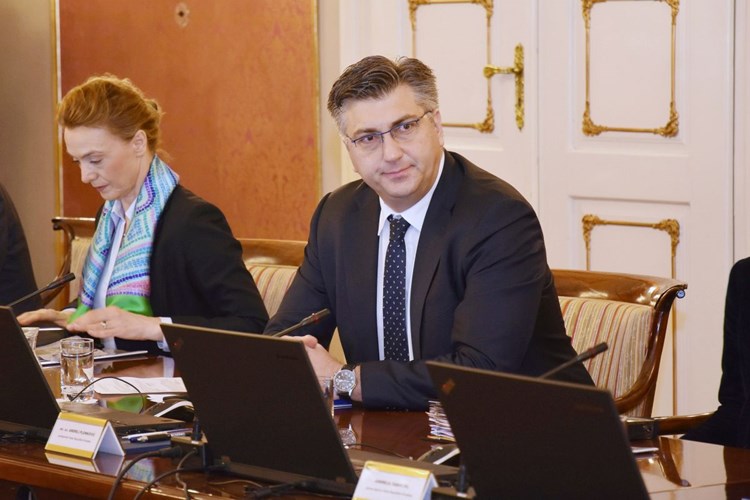


"I condemn in the strongest terms this incident caused by Seselj," Plenkovic said at the start of the government session on Thursday. "He desecrated the Croatian flag and shouted insults at the parliamentary delegation," the PM said.
The government supports Parliament Speaker Gordan Jandrokovic's decision to terminate his visit to Serbia.
"I expect Serbia to harshly and unequivocally condemn this act committed by a member of the national parliament who once again reiterated his harsh and ruthless rhetoric and behaviour towards Croatia," Plenkovic said.
"We also expect the continuation of dialogue and relations with Serbia to be in the context of Serbia's condemnation of such behaviour," Plenkovic said, adding that Wednesday's opening of the Croatian Chamber of Commerce's office in Belgrade, that took place after the incident, was a clear signal that Croatia wanted to continue to promote relations and step up trade, economic cooperation and work on good-neighbourly relations. He, however, reiterated that Serbia needed to unequivocally condemn the incident.
The government will continue to build relations with the neighbours and we will respond to such moves resolutely and appropriately to protect the dignity of Croatian symbols and Croatia in general, Plenkovic said.
Prime Minister Andrej Plenkovic, speaking at a government session on Thursday, called on both those in favour and those against the Istanbul Convention to implement it together and efficiently, saying that the implementation was good, noble and useful.
"I call on all stakeholders in the process to calm tensions because with the interpretive statement accompanying the Convention, the Croatian government guarantees that there will be no problems that would go against the values in the legal and education systems," Plenkovic said.
The government is confident the Convention will bring benefits, primarily to women who are victims of violence, Plenkovic said, calling on both those in favour and those against the Convention to implement it together and efficiently.
"Nothing unusual has happened in any other country that ratified and implemented the Istanbul Convention and nothing unusual will happen in Croatia either, and I invite everyone to have faith in the Croatian institutions," Plenkovic said.
Plenkovic spoke about the Council of Europe (CoE) convention on preventing and combating violence against women and domestic violence at the start of the government session, commenting on CoE Secretary General Thornbjorn Jagland's visit to Zagreb on Tuesday.
Croatia will for the first time in its history take over the six-month presidency of the Council of Europe in Copenhagen on May 22.
Plenkovic said that he had told Jagland that it was not good for an organisation such as the Council of Europe to have the topic of one convention, which is noble and good, burdened by other topics and debates.
"This is a situation that creates difficulties both for the Council of Europe and for countries that need to ratify it, at times of pan-European campaigns launched by agile activists who are against the ratification, notably those in the nongovernmental sector," Plenkovic said.
This is why Foreign and European Affairs Minister Marija Pejcinovic will explain Croatia's position on the Istanbul Convention at the meeting in Copenhagen, Plenkovic said.
He reiterated that the fight against corruption, decentralisation, the protection of the rights of ethnic minorities and vulnerable groups as well as the protection of cultural heritage would be the priorities of Croatia's presidency of the Council of Europe.
A total of 26 events have been planned to be held during Croatia's CoE presidency, which will be an opportunity to promote the said topics and Croatia, and to strengthen common values, notably in the area of human rights.
Text: Hina